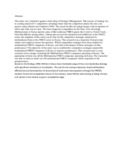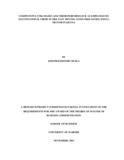| dc.description.abstract | This study was conducted against a back-drop of Strategic Management. The essence of strategy lies in creating tomorrow‟s competitive advantage faster than the competitors mimic the ones you possess today (Hamel and Prahalad (1994). The search for this advantage begins with recognition of where and what you are now. The most dangerous competitors are the basis of its advantage. Multinationals in Kenya include some of the traditional FMCG giants like Unilever, Nestle Foods, GlaxoSmithKline among others. Taking into account the dynamism and turbulence in the FMCG sector, the emphasis of this study was to find out the competitive strategies employed by multinational firms in the FMCG sector in Kenya. This research was a departure from previous studies and sought to answer the question: Which competitive strategies have been adopted by multinational FMCG companies in Kenya, and what is the impact of those strategies on their performance? The objective of the study was to establish the competitive strategies adopted by multinational FMCG companies in Kenya to improve performance. This research used a cross-sectional survey design examining the Multinational FMCG companies operating in Kenya. The population of study was all the Multinational FMCG companies operating in Kenya. The researcher was able to study in detail ten (10) multinational FMCG companies which responded to the questionnaires.
Based on the findings, MNC FMCGs in Kenya have moderate usage of low-cost leadership strategy with significant variations in its adoption. The use of cost-cutting measures, improved business efficiencies and maximization of economies of scale were most popular amongst the FMCGs studied. Due to the competitive nature of the industry, most FMCGs were aiming at being the low-cost leader in the market to gain a competitive edge. | en |


